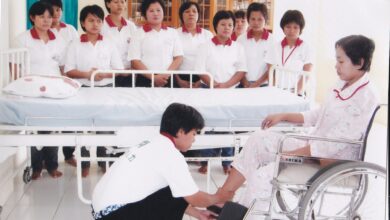Ahead of Ramadan, These Are Healthy Tips When Fasting

There are at least 7 tips or tips to stay healthy during Ramadan fasting. Anything?
 IN Al-Quran Surat Al-Baqaroh verse 184 ALLAH SWT says, "…… And fasting is better for you if you know."Medical and health experts from ancient times until now have tried to reveal the benefits of fasting for human health, even making fasting a part of therapy or treatment of diseases.
IN Al-Quran Surat Al-Baqaroh verse 184 ALLAH SWT says, "…… And fasting is better for you if you know."Medical and health experts from ancient times until now have tried to reveal the benefits of fasting for human health, even making fasting a part of therapy or treatment of diseases.
In order to get the health benefits of fasting, it is recommended that we fast at least 30-40 days a year. And fasting in medical and health sciences means resting the digestive tract (intestines) along with enzymes and hormones, which normally work to digest food continuously for approximately 14 hours.
There are several tips during fasting to stay healthy and fit.
1. Don't leave sahur
In a hadith, Rasulullah Saw said, "Sahurlah you, because in that sahur there is a great blessing". Why is sahur important for those of us who fast? When fasting our bodies do not get nutritional intake for about 14 hours. For this reason, so that the body can function properly, the body's cells need adequate amounts of nutrients and energy.
For the sahur menu, you should choose fiber and high protein foods so that digestion and absorption of food will also take longer, but avoid consuming too much sweet food.
At the time of eating sahur, it should also be accompanied by a sincere intention to fast on that day. With sincere intentions, it is hoped that we will be consistent in fasting and Allah SWT accepts our fast.
2. Do not delay breaking the fast
After a day of stifling hunger and thirst, of course our energy is drained, to restore energy again, when breaking the fast, eat simple carbohydrates found in sweet foods.
Foods that contain sugar instantly restore our drained energy all day long, and what is recommended and following the Sunnah of the Prophet Muhammad is with dates and plain water. But try to avoid drinking ice or fizzy ones, because these types of drinks can make digestion not function normally (an empty stomach can become bloated, if you break your fast immediately with cold water, because the stomach acid in our bodies will form more and more).
3. Eat gradually when breaking the fast
Usually when we hear the sunset drum, without waiting, we immediately eat the dishes provided on the table. This is not a good pattern for health, after a day of emptying our stomachs and resting our digestive organs, it's best not to eat large meals right away.
What we need to pay attention to when we are hungry, because fasting all day long is not an excuse to indulge in our appetite when breaking the fast.
The needs that we must meet are 50-60% carbohydrates, 10-20% protein, 20-25% fat, enough vitamins and minerals from vegetables and fruit. And the distribution of food is 50% for breaking the fast, 10% after Tarawih prayer and 40% at Suhoor.
When the time comes, open it with dates or water according to the sunnah of the Prophet SAW. You can also break the fast by eating sweet foods, such as compote, or drinking warm tea. Then take a short break, we can use that pause to perform maghrib prayers while giving our digestive organs time to adjust.
Only after the prayers can we continue eating heavier foods such as rice and side dishes. And after Tarawih, it is continued with a small meal or snack session.
4. Keep exercising in the afternoon
Running fast does not mean stopping exercise completely. In fact, physical activity is still needed to maintain blood circulation so that we don't get sluggish easily. However, for this matter, choose light sports that don't require excessive energy, such as jogging or walking. We recommend that you do sports before breaking the fast.
Enforcing tarawih prayer apart from worship is also a means of maintaining physical fitness because doing tarawih prayer is the same as burning calories.
5. Try to take a nap
Sleeping during the day will reduce hunger stimulation that comes from the stomach and can reduce the reduction in fluids in the body from being exposed to sunburn.
6. To be free of bad breath
Fasting means that there is no intake by mouth, so it often causes bad breath. Avoid eating dishes that smell 'fantastic', such as petai, jengkol, and raw onions at mealtime. After eating sahur, drink enough water!
Brushing your teeth and brushing your tongue after eating and at bedtime. Can gargle with a special solution (antiseptic) to get rid of bad breath. Betel leaf boiled water can be used to rinse your mouth after eating suhoor. Betel boiled water functions as an antibacterial that causes bad breath.
7. Consume enough water
Water is a substance that is needed by the body. More than 60% of our body consists of water. To carry out its functions properly, every organ of our body needs water. Without enough water the body will be impaired.
For that, drink lots of water for deposits in the body so that all organs function properly.
What is called water here is not only water, but milk and tea are also included in it. In order for the body's needs to be fulfilled, arrange for us to drink eight glasses of water before fasting the next day.
Enough fluids, by drinking approximately 7-8 glasses a day. Consists of three glasses of dawn and five glasses from opening until before bed. (From various sources by dr. Yahmin Setiawan, MARS [Dirut RS. Integrated Healthy Home Dompet Dhuafa], Dompetdhuafa.org). *



